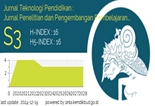Analysis of The Mathematical Problem-Solving Ability on Two-Variable Linear Equation System Material In Grade VIII Students
Abstract
Keywords
Full Text:
PDFReferences
Abzani & Leonard. (2017). The influence of locus of control on mathematical problem-solving ability. Proceedings of the National Panel on Mathematics Education Discussion, 549-558. Https://journal.lpp.munindra.ac.id/inde/x/php/repository/article/view/1957.
Agustina, T. R., Subarinah, S., Hikmah, N., & Amrullah, A. (2021). Ability to solve math problems in open-ended circle material problems based on students' initial mathematical abilities. Griya Journal of Mathematics Education and Application, 1(3), 433–441. https://doi.org/10.29303/griya.v1i3.85
Ain, H., Baidowi, B., & Hapipi, H. (2020). Students' Ability in Geometry Problem Solving Based on Van Hiele's Level of Thinking. Journal of Incandescent Mipa, 15(3), 273–279. https://doi.org/10.29303/jpm.v15i3.1886
Aristia, B. E., Sarjana, K., Junaidi, & Turmuzi, M. (2023). The relationship between adversity quotient (AQ) and mathematical logical intelligence on mathematics learning outcomes of grade VIII students of SMP Negeri 1 Terara for the 2022/2023 academic year. Pendas: Scientific Journal of Basic Education, 08(02), 2665-2676. DOI: https://doi.org/10.23969/jp.v8i2.10058
Hardani, Auliya, N. H., Andriani, H., Fardani, R. A., Ustiawaty, J., Utami, E. F., Sukmana, D. J., Istiqomah, R. R. (2022). Book of Qualitative & Quantitative Research Methods. In LP2M UST Jogja (Issue March).
Khatami, M. F., Sridana, N., Hayati, L., & Amrullah, A. (2022). Analysis of mathematical problem-solving ability in solving competitive problems in terms of mathematical logical intelligence. Griya Journal of Mathematics Education and Application, 2(1), 214–225. https://doi.org/10.29303/griya.v2i1.146
Kalamu, L., Hulukati, E., Badu, S. Q., & Panai, H. (2018). The Effect of Locus Control on Mathematical Problem Solving Ability of Gorontalo City State Middle School Students. 9(34), 57–63. Https://www.iiste.org/Journals/index.php/JEP/article/view/45883
Kalamu, L. (2021). The Effect of Locus of Control on Student Learning Motivation. KAMBOTI: Journal of Social and Humanities, 1(2), 133–143. https://doi.org/10.51135/kambotivol1iss2pp133-143
Kalamu, L., & Djafar, H. (2022). The influence of locus of control on students' mathematical reasoning. Delta-Pi: Journal of Mathematics and Mathematics Education, 11(1), 68. https://doi.org/10.33387/dpi.v11i1.4356
Nafisah, K., Turmuzi, M., Triutami, T. W., & Azmi, S. (2022). Analysis of mathematical problem-solving abilities on flat-sided space building material based on students' initial mathematical abilities. Griya Journal of Mathematics Education and Application, 2(3), 719–731. https://doi.org/10.29303/griya.v2i3.213
Nurfitriyanti, M., Rosa, N. M., & Patimah, F. (2020). Adversity Quotient and Locus of Control and Their Effects on Mathematical Problem Solving Ability. Proceedings of the National Seminar on Science, 1(1), 479–486. https://proceeding.unidra.ac.id/index.php/sinasis/article/viewFile/4020/667
Polya, G. (1973). How to Solve It: A New Aspect of Mathematical Method. USA: Princeton University Press, Princeton, New Jersey.
Rizqullah, N., Muhtasyam, A., & Yuhana, Y. (2023). Mathematics Curriculum Development: Based on Curriculum Objectives. Histogram: Journal of Mathematics Education, 7(1). https://doi.org/10.31100/histogram.v7i1.2520
Rotter, J. B. (1966). Generalize D Expectancie S for Interna L Versus. 80(1). https://doi.org/10.1037/h0092976
Sari, N. I., Amrullah, A., Azmi, S., & Sarjana, K. (2021). Analysis of the Level of Metacognition of Learners in Solving Mathematical Problems. Griya Journal of Mathematics Education and Application, 1(1), 36–43. https://doi.org/10.29303/griya.v1i1.10
Soleh, M., M. I. Burhani, & L. Atmasari. (2020). Hubungan Locus of Control Dengan Prokrastinasi Akademik Pada Mahasiswa Psikologi IAIN Kediri. Happiness: Journal of Psychology and Islamic Science, 4(1), 104-115. DOI: https://doi.org/10.30762/happiness.v4i2.366
Subarinah, S., Hikmah, N., & Azmi, S. (2020). Analysis of Students’ Mathematical Investigation Based on the Variation of Mathematical Abilities. 465(Access 2019), 115–118. https://doi.org/10.2991/assehr.k.200827.030
Sugiyono, P. D. (2018). Qualitative Research Methods: For exploratory, interpretive, interactive, and constructive research. Bandung: Alfabeta.
Sumantri, M. A., & Pratiwi, I. (2020). Locus of control: Attempts to decrease social loafing. Scientific Journal of Applied Psychology, 8(1), 10. https://doi.org/10.22219/jipt.v8i1.7846
Turmuzi, M., Sripatmi, Azmi, S., & Hikmah, N. (2018). Application of Creative Problem Solving (CPS) learning to improve the problem-solving ability of mathematics education students. J.Incandescent MIPA, Vol. XIII No. 1, Hal. 45-50. DOI: https://doi.org/10.29303/jpm.v13i1.470
Ulima, H.D. (2022). Analysis of Students' Mathematical Problem-Solving Ability Reviewed from the Locus of Control on Arithmetic Line and Series Material in class XI IPA SMA Adhyaksa 1 Jambi. Thesis: Jambi University. https://repository.unja.ac.id/id/eprint/30795
DOI: https://doi.org/10.33394/jtp.v9i1.10653
Refbacks
- There are currently no refbacks.
Copyright (c) 2024 Syafa Aulia, Sri Subarinah, Syahrul Azmi, Amrullah

This work is licensed under a Creative Commons Attribution-ShareAlike 4.0 International License.
This Journal has been Indexed by:
Jurnal Teknologi Pendidikan
ISSN: 2656-1417 (Online)
ISSN: 2503-0620 (Print)
Published by Program Studi Teknologi Pendidikan, FIPP
Universitas Pendidikan Mandalika
Email: [email protected]

This work is licensed under a Creative Commons Attribution-ShareAlike 4.0 International License.















.png)






